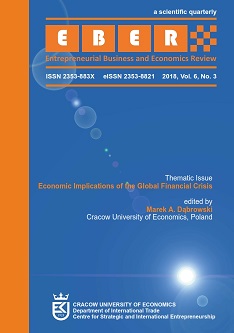Trade-Finance Nexus: Was it Distorted in the Aftermath of the Global Financial Crisis?
Trade-Finance Nexus: Was it Distorted in the Aftermath of the Global Financial Crisis?
Author(s): Marta Wajda-Lichy, Paweł KawaSubject(s): Supranational / Global Economy, Economic history, International relations/trade, Economic development, Financial Markets
Published by: Uniwersytet Ekonomiczny w Krakowie
Keywords: financial development; international trade; trade-finance nexus; financial crisis;
Summary/Abstract: Objective: The objective of this article is to examine whether the trade-finance nexus was distorted in the aftermath of the global financial crisis. Research Design & Methods: We estimated OLS regressions between trade and finance for 36 countries. The Quandt-Andrews breakpoint test and Bai-Perron multiple breaking point test were used to test for structural breaks in the trade-finance nexus. Findings: The results show that a structural break in the trade-finance relationship occurred in 2008 in the majority of the examined countries. The structural changes were relatively more often identified in middle-income countries than in high-income ones. This finding confirms our suppositions inferred from the stylized facts that reactions of international trade and financial development in the crisis era differed across the countries depending on their level of development. Implications & Recommendations: Our study partly fills the gap between theory-based approaches to the trade-finance nexus and empirical evidence. It also emphasizes the need of a revision of traditional theoretical arguments, including those referring to the linkages between the financial and the real sides of economy. Contribution & Value Added: Our article contributes to the theoretical discussion in three ways. Firstly, we examine a still bothering question on the relationship between the financial and the real sides of economy. Secondly, while the main strand in the literature deals with finance-growth and trade-growth interactions, we focus directly on the trade-finance linkages. Thirdly, our finding that a break in the trade-finance nexus was more pronounced for the middle-income countries may provide some insight into better understanding of the global financial crisis of 2008 and its consequences.
Journal: Entrepreneurial Business and Economics Review
- Issue Year: 6/2018
- Issue No: 3
- Page Range: 11-27
- Page Count: 17
- Language: English

